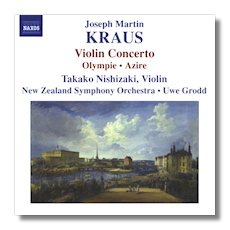
The Internet's Premier Classical Music Source
Related Links
- Kraus Reviews
- Latest Reviews
- More Reviews
-
By Composer
-
Collections
DVD & Blu-ray
Books
Concert Reviews
Articles/Interviews
Software
Audio
Search Amazon
Recommended Links
Site News
 CD Review
CD Review
Johann Martin Kraus

- Violin Concerto 1
- Olympie: Incidental Music
- Azire: Ballet Music
1 Takako Nishizaki, violin
New Zealand Symphony Orchestra/Uwe Grodd
Naxos 8.570334 DDD 58:36
Although he was born in Germany, Johann Martin Kraus (1756-1792) often is referred to as "the Swedish Mozart." (One notes that their dates are almost identical.) He moved to Sweden in 1778, but it was three years before he was able to secure an appointment as Vice Kapellmeister at the court of Gustav III, the King of Sweden. (This is the same Gustav III who was assassinated at a masked ball – the source for Verdi's opera Un ballo in maschera.)
The opera Azire was one of the first works that Kraus wrote in Sweden. It was not accepted by the Royal Swedish Academy of Music. Little of the music survives beyond what has been programmed here. These five sunny dances – some of them rustic, others courtly – give little idea of what the opera must have been like. (Apparently the plot dealt heavily in supernatural elements.) This music is as light and tasty as a perfect soufflé. The writing for wind instruments is particularly easy on the ears.
The tragic drama Olympie was produced in 1792 for Gustave III. Adapted from Voltaire's play, this is a story of familial duty and divided allegiances, with a hefty body count by the time the drama is over. Kraus's incidental music, as recorded here, consists of a stormy overture, a march for wind band, four entr'actes, and a postlude. Kraus's first-class music would not be out of place in Mozart's Don Giovanni or La Clemenza di Tito, although it sounds even more like it could have come from one of Haydn's Sturm und Drang symphonies.
The Violin Concerto, composed before Kraus's departure for Sweden, is a very different work. Although it is large in scale (just over 30 minutes), its personality is placid, compared to the other works on this CD. Kraus was a proficient violinist, but it is not certain if he wrote this work for himself or for someone else. It requires a skilled violinist. The writing is not showy, however, and furthermore, it treats the soloist and the orchestra as equal partners. It is an enjoyable concerto, but not as striking as much of Kraus's work from his Swedish years.
Conductor Uwe Grodd has made several recordings for Naxos of music by lesser-known Classical composers, including Dittersdorf, Vanhal, and Cannabich. (Grodd also is a flutist.) He's clearly in his element here; these readings are stylish and committed. The New Zealand Symphony Orchestra plays well for him. In the concerto, Nishizaki seems a little reticent, but perhaps this is a function of the music. The fine booklet notes are by Bertil van Boer, a Kraus specialist who wrote the cadenzas for the Violin Concerto. The engineering is good too, except there is a pervasive rhythmic rumble that can be heard between tracks. Whatever it is, at times it is distracting, but it is not bad enough to ruin this CD. This is the première recording for all three works.
Copyright © 2008, Raymond Tuttle




















